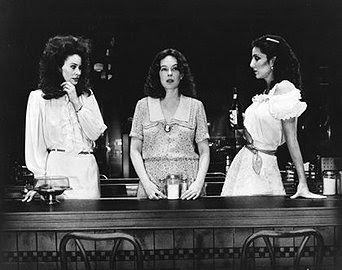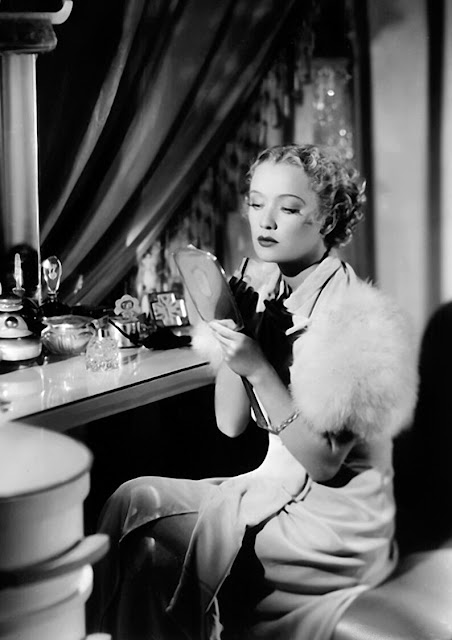Sandy Dennis: A Willful Intent To Grow
Tenn in Conversation
Royal Orleans Hotel
New Orleans
1982
There is a belief among some--primarily critics--that an actress willfully commits to the commission of a particular set of mannerisms and attitudes and that this act is often malicious, full of enmity. I have read far too many attacks on friends and colleagues that read like police reports: Actress "A" was seen last night willfully committing this or that crime, and punishment must be sought.
It is entirely right, as Harold Clurman persistently reminded us, to like or dislike as you please. We all have our own tastes, desires, needs. However, you as an audience member arrive with every bit as many prejudices, predilections, and limitations as the greatest actress. We do what we can, as I always say. The artist arrives and gives what he or she can. That is all. You may like it or not, but there is no malicious intent if we fail.
I write what I can write, and it is loved, liked, hated, or abused. Those are the breaks. That is the scene. I would be foolish to expect or demand universal acclaim. Anyone would be. What I despise is the imposition of intent provided by people who know nothing about me or the creative process. Just tell me why you like or don't like my work, but do not ascribe anything to my commission of it.
You ask about Sandy Dennis. Everyone does. There is a cottage industry alive and well in analyzing and dissecting this actress, and I understand the interest, even as I fail to understand the underlying goals of so many of the analysts.
My first encounters with Sandy were in minor plays that, in my opinion, she elevated with a concentration and a sense of detail that I found extraordinary. She was much acclaimed and generously awarded, and then she did [Edward] Albee's film [Who's Afraid of Virginia Woolf?], for which she was again praised and prized. Success almost always brings out a particularly venomous form of attention, and Sandy was hit with it at the precise moment that she was also hit with success, with some sense of financial reward, with some sense of self-confidence. It was brutal, I think, although she maintained a mordant sense of humor and a healthy distance from the nonsense of gossip and speculation that attend what we call stardom. I think--I still think--that she cares deeply about being a good actress and truly developing a character. I think that we need to understand that when we see her, she is fully applying all that she has and all that she is, and, of course, we are free to accept or deny her gifts. We are not, I feel, entitled to tell her she should be disabused of the notion that she is an actress.
Sandy has played two of my parts--Blanche and Maggie. I would never see her or think of her in these parts, and she went to the environs, the outskirts, to play them. 'I want that experience,' she said. 'I want demands placed on me.' Her questions were piercing and intelligent, and while her lineaments were entirely wrong for Maggie, her understanding of that woman surpassed that of Barbara [Bel Geddes]. Sandy understood the aching of rejection, of the persistent fight for financial and amatory security. Her take on Blanche was quite extraordinary, even if she appeared entirely too young at the time she played it: She was about thirty or so, and looked twenty. That Alice-in-Wonderland forehead didn't help: She was far too youthful. However, her grasp of the fight in which Blanche finds herself--the search for friendly coffers---was visceral and brilliant. [Tenn did not mention that Dennis also appeared in his Eccentricities of A Nightingale. I do not know why.]
Sandy is terribly smart and curious, which is why her comedic performances are so good. What I don't think people recognize is her lack of vanity: She knows what her inventory presents, and she often mocks it as she shares it. I wish you luck in trying to devise a healthy list of actresses who share this trait with her.
Karen Black, Sandy Dennis, and Cher (1982)
I like her work with Robert Altman: Investigate that film where she takes in a young boy and makes him a sort of captured animal, a wild, amatory bird. [That Cold Day in the Park, 1969.] The recent work, with all the [William] Inge intent [Come Back to the Five and Dime, Jimmy Dean, Jimmy Dean, 1982] has many flaws, but watch Sandy's face: she allows you into her mental processes in a way I've never seen before. She boils and thinks and plots, and I thought she would make a brilliant Amanda, and I regretted that we had lost the occasion of her Alma.
Conversations with Sandy--and I had fewer than I might have wished--were vertiginous affairs: Her mind flew about as wildly as mine did, but her mien, her lovely, fawn face was grave and still. I think she was always in thought and always poised for flight: She was every bit as uncomfortable in most social affairs as I am. Sandy gives freely with her opinions and her thoughts, and she is a magpie. Ask her about anything and you'll go on a marvelous trip.
I try to think of her when I write. I would like to think something will happen. Sandy has an admirable and willful intent to grow and to change. I admire that. I admire her.







Comments
Post a Comment
Thank you for your comments. The moderators will try to respond to you within 24 hours.